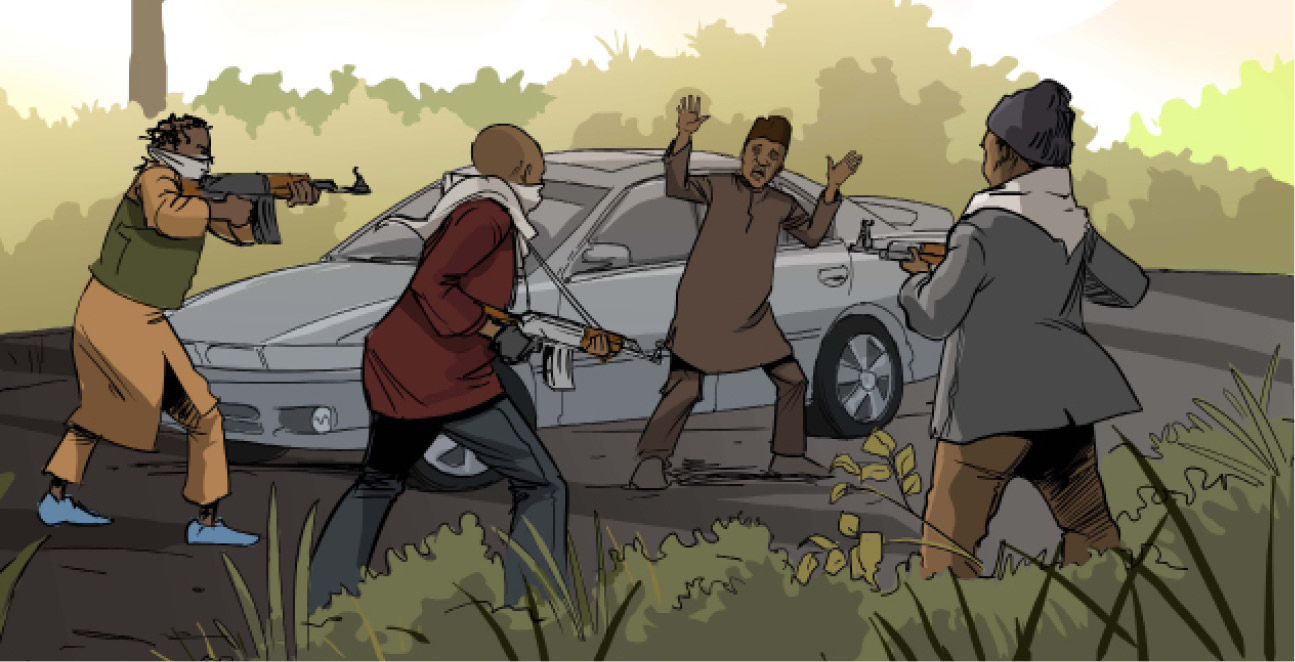Ali’s nightmare started on a cold December night when, along with other victims, they started their journey deep into the forest. They started walking at around 9 pm and stopped only when they heard the call to prayer, signifying dawn.
‘Do they pray?’ I asked naively.
- Kano: Hisbah commander arrested with married woman in hotel
- FCT minister wants Apo-Karshi road opened before rainy season
‘No, but we were allowed to’.
The kidnappers would find the nearest rock where they would take shelter and sleep until it was dusk again, so that they would start moving. Ali narrated how he collapsed on the first day and fell fast asleep the moment they were allowed to rest. The kidnappers would cook rice and beans with palm oil and offer it to them to eat. They took turns, these Fulani kidnappers, in guarding them and often swapped teams at designated points. They were divided into the ‘kingpins’ and the ‘yaro boys’. Ali and the rest of the victims usually slept between these two factions. When one wanted to answer the call of nature, he would have to call the attention of one of the ‘yaro boys’ to avoid being shot.
This routine continued for days, walking for up to 10 hours at night and resting on higher ground during the day time. They never slept at the same spot twice and resting on rocks made it possible for the kidnappers to have the advantage of seeing any approaching vehicle. One thing Ali kept repeating to me was: ‘they are highly organised’. He repeated it so much that I got the impression that he was impressed. During the day time, they would make the phone calls demanding for ransom from families. Once, when the kidnappers handed Ali the phone so that he could persuade his parents to pay, he said to them instead ‘Ba damuwa fa. I am fine’. The kidnappers got so angry that they started to beat him. ‘Shege, do you think you are here on a holiday?’ Another time, when he was asleep under a tree, one of the men hit him with a stick, ‘Dan iska, let me not hear you snoring again! Do you think this is a joke?’
During the night they walked, these seemingly illiterate Fulani men could be heard conversing with their wives over the phone, asking after their children and other family members. Sometimes, they would take a break to smoke weed and it was during this period that the ‘yaro boys’ tongues would loosen. In their marijuana ‘high’ they recounted tales of their many escapades. Ali, learnt that the kidnappers had informants who worked as labourers on their farms. These people, who his father was generous to, were the ones who had sold them out. He heard about a certain ‘Hajiya’ in Abuja, whom they claimed sold guns to them. They lamented about how broke they were whenever it was time to contribute money to buy weed. Whenever they ran out of food supplies, two of them would go to a nearby village and raid a shop. Gradually, the victims grew accustomed to the black, terrible tasting water and the oily rice. It was either that or starvation; they chose the former.
As negotiations with their family members continued, Ali noticed that the men were beginning to get desperate. Some of them insisted that Ali’s father be made to sell his house, while the rest just wanted to collect the cash at hand and leave. Ali, recognising their vulnerability, used the opportunity to persuade the man who wanted to collect the cash at hand.
‘You better tell your people to collect wetin dem fit get. My father na stubborn man, he will not sell his house.’
It seemed his plan worked, because a few days later, he overheard his kidnappers giving directions to someone over the phone. A family member had volunteered and came with a taxi. Ten armed men went to meet the driver, while the other five stayed with Ali. Again, money was collected and the counting began. Ali and other victims were given Maltina to drink. Satisfied with the money, the head of the kidnap team beckoned on Ali to come closer.
‘Shege! Take this N5,000 for the road. You don try!’
The driver and another victim were also given N5,000 each ‘for the road’. The whole situation would have been funny, were it not so outrageous. They were escorted to the car and told in which direction to go. Imagine their surprise when the next town they turned up in was Rubochi! The last town before Kogi! The realization that they had walked over 100km suddenly dawned on Ali and he felt dizzy with relief.
Why this long story, you wonder?
Two things. One, security in this country is a joke.
And two, these Fulani herdsmen are not as dull as we think.
Ali has since reunited with his family and gradually, they are trying to put this episode behind them. But, can they? They open the windows and see Fulani men peddling jerrycans of water on the streets and they wonder if they are informants. The Fulani farmers who work for his father swear that they are not the ones. They however give the number of someone familiar to them, who suddenly disappeared after the kidnapping. The number has since been passed to the police, yet we hear nothing.
Wikipedia defines ethnic profiling as the act of suspecting or targeting a person on the basis of assumed characteristics or behaviour of an ethnic group, rather than on individual suspicion. All over the world, the case is the same, whether we are referring to ethnic or racial profiling, law enforcement agencies continue to profile people based on their ethnicity: Arab? Terrorist. Black? Thug. African? Cyber fraud, freeloader or beggar. Take your pick.
Once, during a postgraduate exam in LUTH, a professor pointed at me and instead of reading out my name which was boldly written on my name tag, shouted: ‘Fulani! Come and stand in front of room 7’. And that was it. I was called Fulani throughout the exam.
In the case of Nigeria, the common stereotyping is that every Igbo person is into yahoo yahoo, every Benin girl a prostitute and every Fulani person, a violent kidnapper or suicide bomber. And while we all collectively condemn this practice of profiling, isn’t there an ounce of truth in it? Statistically, when you look at the Nigerian names on the FBI wanted list for cyber fraud, do they not mostly belong to a particular tribe? They do! So, do we come out and say all Igbos are fraudulent? No, we don’t. The same logic applies to the Fulani.
Agreed, not all Fulani are kidnappers. Nor are they all herdsmen; Hell! I have never owned a cow in my life! Not all of them are nomads and certainly not all of them are blood-thirsty, cattle-rustling, trigger-happy vagabonds. But what of those who are? Why are their numbers rising? What are we doing about the numerous unemployed Fulani youths who are shinning your shoes while you relax in your homes in Asokoro? Do you not think that they are watching you? Envying you? Searching for security lapses? How can a particular tribe be allowed to roam the nooks and crannies of Nigeria, without boundaries and without education? These people, who grew up in the forests with no religion and no conscience are the ones government wants to dialogue with?
The bitter truth, is that as Fulani in Nigeria, it is not enough for us to dissociate ourselves from those who commit crime. The government cannot afford to wash its hands off a particular ethnic group. These people must be given land for their cattle to graze and enrolled in schools and vocational centres. The common stereotype of the Fulani man in rubber shoes, listening to his radio, without a care in the world, while working as a ‘mai guard’ has got to stop.
If not, we are all doomed.

 Join Daily Trust WhatsApp Community For Quick Access To News and Happenings Around You.
Join Daily Trust WhatsApp Community For Quick Access To News and Happenings Around You.
